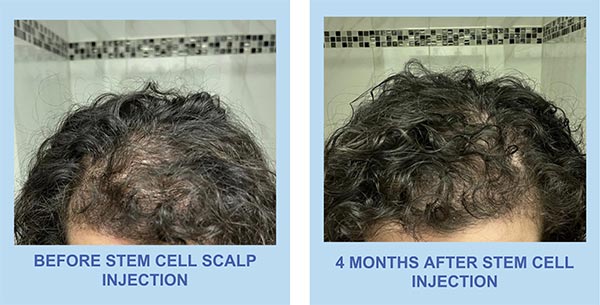Polycystic ovary syndrome (PCOS) affects an estimated 8–13% of reproductive-aged women. Up to 70% of affected women remain undiagnosed worldwide. PCOS is the most common cause of anovulation, a leading cause of infertility, and can produce many troubling symptoms.
Until Now, There Has Been No Cure for PCOS, Only Symptom Management, But Stem Cells May Be The Key To A Cure
Below we will describe a remarkable case history of a PCOS patient treated with stem cells. Before getting into that we will describe the disorder a little more.
Research shows that people with PCOS have long-term, low-grade inflammation in which polycystic ovaries produce androgens (male hormones) and insulin. This can lead to heart and blood vessel problems. The chronic low-grade inflammation-induced polycystic ovaries also may cause:
- Missed periods, irregular periods, or very light periods
- Ovaries that are large or have many cysts
- Excess body hair, including the chest, stomach, and back (hirsutism)
- Weight gain, especially around the belly (abdomen)
- Acne or oily skin
- Male-pattern baldness or thinning hair
- Infertility
Case History
A lean athletic 28-year-old woman presented to us with a chief complaint of thinning hair. She was also noted to have ultrasound-diagnosed polycystic ovary syndrome and abnormal hormone levels. Her periods had been irregular lifelong since menarche at age 14. Her gynecologist told her that none of these problems were serious enough to require treatment, and her only troubling symptom was mild but bothersome, scalp hair thinning. We told her that intravenous injection of umbilical cord-derived stem cells along with injection of these stem cells underneath the skin of the scalp generally results in hair thickening. We did not address her PCOS as she had no other symptoms referable to it and was not seeking care for it.

Stem Cell Treatment
After informed consent, she had an infusion of 100 million umbilical cord-derived AlloRx stem cells from Vitro Biopharma in Golden, Colorado. She also had multiple subdermal injections of 20 million AlloRx stem cells distributed evenly into her scalp.
Follow-Up
At her four-month follow-up, she noted definite visible new hair growth and hair thickening. She also, however, noted that her menstrual periods had been completely regular every month beginning the first month after her treatment – for the first time in her life. Four months after the first treatment she elected to repeat treatment to further accelerate her hair thickening. At her 8-month follow-up, she noticed continued scalp hair thickening and continued regular periods. She also noted that the prior occasional skin breakouts that she used to have were now entirely gone. At this point, we decided to check her hormone levels and found that they had completely normalized. She had previously had a low progesterone level, characteristic of PCOS, but her repeat level was normal after stem cell treatment. We obtained an ultrasound of her ovaries and to our surprise found the previously present cysts were now completely gone. At her last follow-up - 18 months after her first treatment and 14 months after her second - she noticed substantially thicker hair and continued regular periods.
Conclusion
It would appear that stem cell treatment resulted in the complete reversal of her polycystic ovary syndrome along with the elimination of her thinning hair as well as the elimination of her mild skin disruptions – more than a year after her last treatment. This was an unexpected result, however, it is common for us to find unintended benefits of stem cell treatment and we therefore attempt to be vigilant when following up with our patients. While this is only one patient, it is clear that the stem cell treatment essentially eliminated her PCOS. This brings up the exciting possibility that stem cell treatment may have wider application in the treatment, even a cure, of this disorder. This is particularly important since there is no other treatment that directly addresses reversing PCOS. We are actively seeking to treat other patients with this disorder to see if these results are consistent. It would be interesting to see if it could improve the infertility that some PCOS patients experience.
We may be reached at 847-699-6810 or [email protected]. If readers of this column know of people with this disorder seeking treatment, they may direct them there if they choose. We will continue to follow up with our patient to see if the results are enduring. However, even if the condition recurs stem cell infusion could always be repeated, and the results monitored. Either way, this is yet another truly exciting application of stem cell technology. As we open our new stem cell center in Athens, Greece in late February 2024, we will be looking to treat patients from Europe, in addition to our primarily US-based patient population treated in the beautiful Caribbean Island of Antigua. Stem cells as a cure for PCOS almost seems too good and too easy to be true, but we have learned to never be surprised by the beneficial effects of stem cells.











